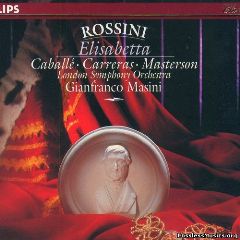Rossini - Elisabetta (Gianfranco Masini) (1992)
Rossini - Elisabetta (Gianfranco Masini) (1992)

CD1 01. Overture (7:19) 02. Act I: Piu' lieta, piu' bella (6:47) 03. Act I: Nel giubilo comun, signore - Esulta, Elisa, omai (2:26) 04. Act I: Quant'e' grato all'alma mia (3:27) 05. Act I: Questo cor ben lo comprende (3:04) 06. Act I: Grandi del regno (1:09) 07. Act I: Vieni, o prode (2:32) 08. Act I: Alta Regina (2:58) 09. Act I: Incauta, che festi! (4:33) 10. Act I: Sconsigliata! (2:47) 11. Act I: Sento un'interna voce (6:37) 12. Act I: Che intesi! (3:09) 13. Act I: Colmo il duol (2:12) 14. Act I: Perche' mai, destin crudele (3:12) 15. Act I: Misera! A quale stato (5:38) 16. Act I: Guglielmo, ascolta (0:42) 17. Act I: Che penso (4:00) 18. Act I: Se mi serbasti il soglio (5:07) 19. Act I: Qual colpo inaspettato (3:46) 20. Act I: Duce, in tal guisa (4:37) CD 2: 01. Act II: Recitativo e Duetto: Dov'e' Matilde? (4:18) 02. Act II: Pensa che sol per poco (3:13) 03. Act II: Non bastan quelle lagrime (3:39) 04. Act II: Terzetto: Misero me! ... La sposa (1:25) 05. Act II: L'avverso mio destino (3:29) 06. Act II: Ah! Fra poco, in faccia a morte (2:16) 07. Act II: Recitativo Chiede Norfolk a te l'accesso (0:56) 08. Act II: Coro: Qui soffermiamo il pie' (4:01) 09. Act II: Aria: Che intesi! ... Oh annunzio! (4:40) 10. Act II: Deh! Troncate i ceppi suoi (5:16) 11. Act II: Recitativo ed Aria: Della cieca fortuna (4:54) 12. Act II: Sposa amata (5:40) 13. Act II: Recitativo e Duetto: E l'adorata sposa (1:54) 14. Act II: Deh! scusa i trasporti (4:23) 15. Act II: Recitativo, Aria e Rondo' finale: Tu, regina! ... deh! come (4:24) 16. Act II: Fellon, la pena avrai (3:02) 17. Act II: Bell'alme generose (4:43) 18. Leicester! (3:05) Norfolk - Ugo Benelli Tenor Elisabetta - Montserrat Caballé Soprano Leicester - vJosé Carreras Tenor Enrico - Rosanne Creffield Mezzo-soprano Guglielmo - Neil Jenkins Tenor Matilde - Valerie Masterson Soprano Ambrosian Singers Choir London Symphony Orchestra Gianfranco Masini Conductor
The Naples years, 1815 to 1822, are at the very centre of Rossini's creative life. It is here that genius—''I had facility and lots of instinct''—was put to school. And firmly so: the serious masterpieces of the Naples years take as their subjects the Bible and Shakespeare, Scott and Racine, Tasso and English historical romance.
Rossini made his debut in Naples with Elisabetta, regina d'Inghilterra. It is a verse reduction of a half-remembered drama by an Italian advocate out of an English romance. It is historically dubious and dramatically ingenuous, but the central situation is interesting (whilst campaigning in Scotland, Leicester, the Queen's inamorato, has married a young girl, a scion of the house of Mary Queen of Scots). As a text it offered the young composer substantial spaces to fill. And being Rossini he filled them with aplomb; yet gracefully and truthfully too. The Philips recording, conducted by Masini with unhurrying grace, has a fine cast. The Matilde is Valerie Masterson, affecting and sweet-sounding. Benelli is a stylish and generally fresh-toned Norfolk; with the young Carreras trailing clouds of glory in the di Stefano style, full of fiery brilliance, well parted as Leicester.
The Elisabetta is Monserrat Caballe, no less. There are some who might want less diplomatic restraint from the jilted Queen than Caballe offers us. She talks of fierce distress but is rarely fierce; her great injunction to Matilde ''Renounce!'' is eloquent rather than imperative. Stendhal described Isabella Colbran, the creator of the role, as a modern commentator might have described Callas. ''When Signorina Colbran talked with Matilde it was impossible to escape the irrefutable conclusion that this woman had reigned for twenty years as a queen whose authority was absolute and supreme. It was the ingrained acceptance of manner and mannerism bred by despotic power which characterized this great artist.'' Caballe communicates little of this vocally. Yet she is regal, and very feminine. Rightly so, for Elisabetta's music is exquisitely rather than fiercely wrought. Elisabetta's final scene is a miracle of soft sweet inwardness; and the glorious duet with Matilde is like an ethereal preview of ''Mira, o Norma''. The libretto, in fact, dictates a sweet reasonable queen. --- Richard Osborne, Gramophone [12/1992], arkivmusic.com
download (mp3 @320 kbs):
yandex 4shared mega mediafire zalivalka cloudmailru uplea








